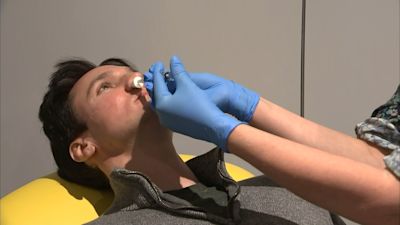Exclusive
The 'sweet tasting' Covid vaccine sprayed into the nose that could be more effective than jabs

ITV News Health Editor Emily Morgan asks a trial volunteer what it's like to have a Covid vaccine sprayed into the nose
This time last year, we were all preparing to go into a second coronavirus lockdown. Covid cases had risen, winter was coming and the vaccine was still some weeks away from being approved. Things did not look good, especially for the north of England and the Midlands.
Now, not only have we fully vaccinated a large majority of the population, but nearly nine million have had a booster or third jab.
And that’s not all. Oxford University has given us exclusive access to the phase 1 trial of their Oxford/AstraZeneca vaccine for use in a nasal spray.
After receiving the vaccine through his nose, trial volunteer Lyle Hopkins told me it was " a lot better than he was expecting".
"I thought it was going to tingle or something, but I could hardly feel it. It tasted quite sweet, it had a sort of sugary taste," he added.
Scientists have already given 30 unvaccinated people the nasal spray and will now administer it in 12 others, who have had their first two doses, as a booster. The aim of this phase of the trial is to establish safety - to basically ensure it doesn’t have any adverse effects.
The aim of the whole trial is to establish whether giving the Covid vaccine in this way generates an immune response and stops infection.
Many immunologists believe that using this technique might actually achieve much greater protection, especially against transmission and mild disease. If so, this could be very exciting.
"If you receive a vaccine in the nose, it may be particularly good at creating an immune response that is targeted to the nose and particularly good at blocking infections there," said Dr Sandy Douglas, who is leading the study.
It wouldn’t be the first vaccine in a nasal form. Young children are given the flu jab this way and hayfever sprays have been around for years. Having a better immune response to a spray might not be the only benefit.
Dr Sandy Douglas explains what his team are hoping to achieve with the study
We know young children will be much more inclined to have the jab if it isn’t via a needle. The same could be said for many 12-15 year olds who would probably prefer a spray. Then there’s the adults - the needle intolerant and those who perhaps just find intramuscular injections uncomfortable.
"The existing vaccines are great - I really don't want people to see this today and think: 'I'll wait for the spray vaccine' because this isn't likely to be available for a year or more even if things go perfectly to plan. What we're trying to do here is target places where there may be room for improvement," Dr Douglas said.
Saying that, if a nasal spray can drive up vaccine uptake and be more effective at reducing transmission then it’s a win, win situation. Who knows, maybe this time next year I’ll writing about the first Covid vaccine nasal sprays being given in this country.